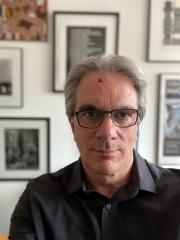Honorary Professor David Campbell

David Campbell has researched and taught visual culture, geography and international politics at universities in Australia, the United States and the United Kingdom including, as full professor, at Newcastle University and Durham University. Between 2015 and 2020 he worked in senior management at the World Press Photo Foundation in Amsterdam, first as the Director of Communications and Engagement and then as Director of Programs and Outreach. In June 2021, in addition to his consultancy work, he joined The VII Foundation as the Managing Editor of VII Insider, its online platform for debate and discussion to advance the production and analysis of documentary stories addressing complex social, economic, environmental and human rights issues.
Campbell has made significant scholarly contributions in at least two realms. First, his work spearheaded a scholarly movement that introduced questions of identity to the study of foreign policy and geopolitics. Campbell’s books remain highly cited, including Writing Security: United States Foreign Policy and the Politics of Identity (Minneapolis: University of Minnesota Press, revised edition 1998) and National Deconstruction: Violence, Identity and Justice in Bosnia (Minneapolis: University of Minnesota Press, 1998). Second, Campbell’s research on visual culture examines how photojournalism enacts our world and how digital technologies are transforming the capacity of photography to tell stories about international politics. Key essays here appeared in Political Geography, the Review of International Studies, the Journal of Human Rights, the Journal for Cultural Research and the Australian Journal of Political Science.
Campbell’s involvement with UQ takes place through POLSIS’ Visual Politics Research Program. He is a Partner Investigator in a multidisciplinary project on “Visualising Humanitarian Crises: Transforming Images and Aid Policy” that is led by Prof Roland Bleiker and funded by the Australian Research Council (2022-25). Campbell plays a key role in the conceptual part of the project, which explores the political and ethical dimensions of photojournalistic depictions of crises.
